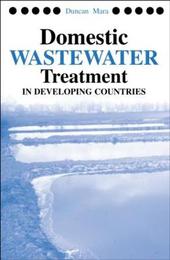
|
Domestic Wastewater Treatment in Developing Countries
Hardback
Main Details
| Title |
Domestic Wastewater Treatment in Developing Countries
|
| Authors and Contributors |
By (author) Duncan Mara
|
| Physical Properties |
| Format:Hardback | | Pages:210 | | Dimensions(mm): Height 234,Width 156 |
|
| Category/Genre | Waste management
Sustainability |
|---|
| ISBN/Barcode |
9781844070206
|
| Classifications | Dewey:628.3091724 |
|---|
| Audience | | Undergraduate | | Postgraduate, Research & Scholarly | | Professional & Vocational | |
|---|
| Illustrations |
Figures, tables, index
|
|
Publishing Details |
| Publisher |
Taylor & Francis Ltd
|
| Imprint |
Earthscan Ltd
|
| Publication Date |
1 September 2004 |
| Publication Country |
United Kingdom
|
Description
Affordable and effective domestic wastewater treatment is a critical issue in public health and disease prevention around the world, particularly so in developing countries which often lack the financial and technical resources necessary for proper treatment facilities. This practical guide provides state-of-the-art coverage of methods for domestic wastewater treatment and provides a foundation to the practical design of wastewater treatment and re-use systems. The emphasis is on low-cost, low-energy, low-maintenance, high-performance 'natural' systems that contribute to environmental sustainability by producing effluents that can be safely and profitably used in agriculture for crop irrigation and/or in aquaculture, for fish and aquatic vegetable pond fertilization. Modern design methodologies, with worked design examples, are described for waste stabilization ponds, wastewater storage and treatment reservoirs; constructed wetlands, upflow anaerobic sludge blanket reactors, biofilters, aerated lagoons and oxidation ditches. This book is essential reading for engineers, academics and upper-level and graduate students in engineering, wastewater management and public health, and others interested in sustainable and cost-effective technologies for reducing wastewater-related diseases and environmental damage.
Author Biography
Duncan Mara is a Fellow of the Institution of Civil Engineers, the Institute of Biology, the Chartered Institution of Water and Environmental Management and the Royal Institute of Public Health. He is also Professor of Civil Engineering at the University of Leeds and Visiting Professor at the Instituto Cinara, Universidad del Valle, Colombia.
|